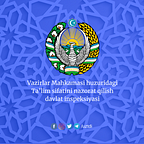Finnish educational programs and textbooks are being studied
The Resolution of the President of the Republic of Uzbekistan “On additional measures for further improvement of the education system” of November 6, 2020, defines the task of introducing the positive experience of Finland in the field of education into the country’s educational system and the National Educational Program.
To ensure the fulfillment of these tasks, large-scale activities are being carried out with the participation of Finnish experts and official representatives.
On April 21 this year, an online workshop was organized on “Studying educational programs of Finland: educational programs and teaching materials” together with the State Inspectorate for Supervision of the Quality of Education, the Ministry of Education and Culture, and the Finnish National Agency for Education.
It was attended by the Director for General Education at the Finnish National Agency for Education, Jorma Kauppinen, and Learning Material Manager of the Agency, Susanna Björkell, as well as the leadership of the Education Inspectorate, responsible officials and representatives of ministries and agencies, specialists, scientists, about 1,000 teachers and methodologists who participated in the development and examination of the concepts of the system of continuous education and educational programs.
At the event, Finnish experts provided comprehensive information about a range of issues related to the Finnish education system, national and local educational programs, textbooks, teaching materials, and teacher training who teach via television.
In particular, according to the Director for General Education at the Finnish National Agency for Education, Jorma Kauppinen, there is no “head-to-head” point in training in the Finnish education system. Young people continue their education from early childhood, even after graduating from general secondary, specialized secondary, vocational, or higher educational institutions.
If the distribution of teaching hours in schools is determined at least 19 hours per week for 1–2 grades, then for 9 grades this figure is 30 hours. According to the school curriculum, the total workload for a nine-year week is 222 hours. In Uzbekistan, this figure is 254 hours.
Schoolchildren have a specific approach to the formation of skills and knowledge related to professions and spheres. In addition to knowledge, skills, characteristics such as approach, attitude and willpower are also important. That is, schoolchildren are regularly trained within the framework of educational programs in vital transversal competencies, along with the knowledge and skills that they must acquire throughout their lives.
“Also, municipalities and schools may change curricula accordingly in response to community needs for specific skills in the area. At the same time, when organizing the educational process in schools, the needs, capabilities, and strengths of students are also taken into account”, said Jorma Kauppinen.
Learning Material Manager at the Finnish National Agency for Education, Susanna Björkell spoke about the system of preparation of educational materials (textbooks, manuals) in the country.
It is noted that in Finland educational materials are prepared based on the national curriculum, the official language is Finnish or Swedish. The main attention is paid to the fact that each educational material has a pedagogical basis in its application to the educational process. The preparation of teaching materials also takes into account the general human values of the country, the educational environment and teaching tips, and the availability of separate materials for teachers.
Besides, when introducing educational programs into the educational process, along with traditional textbooks, electronic teaching aids created using innovative technologies, as well as materials of various formats, are also widely used.
Besides, Finland’s National Public Broadcasting Company, together with the Finnish National Agency for Education, has created a separate television channel for teachers to lead meaningful everyday life, to be able to develop themselves and interact with other teachers. Television programs are mainly aimed at developing youth skills related to the use of media and digital technologies, education, and language learning.
It should be noted that the educational programs used today in Finland have been translated into the Uzbek language and are being consistently studied. During this process, relevant aspects of the Finnish education system will be incorporated into the updated curricula.
During the workshop, specialists and experts of the Education Inspectorate received comprehensive answers from Finnish specialists to several questions of interest to them regarding these curricula and textbooks.
Following the event, an agreement was reached to continue cooperation on the issues discussed.
